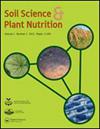Interactive influence of particle size and carbonization temperature on Silicon availability in Rice husk biochar
IF 1.8
4区 农林科学
Q3 ENVIRONMENTAL SCIENCES
引用次数: 0
Abstract
ABSTRACT This study examined the influence of rice husk (RH) particle size, carbonization temperature, and their interaction on the availability of Silicon (Si) in RH biochar obtained from the carbonization of different particle sizes of RH (≤1 mm, >1 mm, and the original size, i.e., the unmodified RH biomass (O_RH)) at varying carbonization temperatures from 300 to 700°C. Silicon content in the biochar was extracted with 0.01 M CaCl2. Results showed that the influence of RH particle size on available Si is modified by temperature. The maximum available Si from the RH biochar were 2145 mg kg−1 at 700°C for O_RH, 2428 mg kg−1 at 600°C for > 1 mm RH and 2562 mg kg−1 at 500°C for ≤ 1 mm RH. These were an increase of 171%, 207% and 224% respectively, compared to the uncarbonized original rice husk (790 mg kg −1). Smaller particle sizes attained the maximum values of available silicon at lower temperatures compared with the original RH probably due to the efficient heat transfer to the smaller RH particle surface because of the smaller packing/void volume between the particles. Thus, the carbonization of smaller particles of RH will produce higher available Si content at a lower carbonization temperature than that required to achieve the same effect in the original RH biomass, thereby saving energy and time.粒度和碳化温度对稻壳生物炭中硅可用性的交互影响
摘要 本研究考察了稻壳(RH)粒度、碳化温度及其相互作用对在 300 至 700°C 不同碳化温度下碳化不同粒度的 RH(≤1 mm、>1 mm 和原始粒度,即未改性 RH 生物质(O_RH))而得的 RH 生物炭中硅(Si)含量的影响。生物炭中的硅含量用 0.01 M CaCl2 萃取。结果表明,RH 颗粒大小对可用硅的影响受温度的影响。对于 O_RH,700°C 时 RH 生物炭中的最高可利用硅含量为 2145 毫克/千克-1;对于 > 1 毫米 RH,600°C 时为 2428 毫克/千克-1;对于 ≤ 1 毫米 RH,500°C 时为 2562 毫克/千克-1。与未碳化的原始稻壳(790 毫克/千克-1)相比,分别增加了 171%、207% 和 224%。与原始相对湿度相比,较小颗粒尺寸的可用硅在较低温度下达到最大值,这可能是由于较小相对湿度颗粒表面的热传导效率较高,因为颗粒之间的填料/空隙体积较小。因此,与原始 RH 生物质达到相同效果所需的碳化温度相比,较小颗粒的 RH 在较低的碳化温度下就能产生较高的可用硅含量,从而节省能源和时间。
本文章由计算机程序翻译,如有差异,请以英文原文为准。
求助全文
约1分钟内获得全文
求助全文
来源期刊

Soil Science and Plant Nutrition
农林科学-农艺学
CiteScore
4.80
自引率
15.00%
发文量
56
审稿时长
18-36 weeks
期刊介绍:
Soil Science and Plant Nutrition is the official English journal of the Japanese Society of Soil Science and Plant Nutrition (JSSSPN), and publishes original research and reviews in soil physics, chemistry and mineralogy; soil biology; plant nutrition; soil genesis, classification and survey; soil fertility; fertilizers and soil amendments; environment; socio cultural soil science. The Journal publishes full length papers, short papers, and reviews.
 求助内容:
求助内容: 应助结果提醒方式:
应助结果提醒方式:


